"We also voted and passed the budget, we are not thinking of bringing a supplement"

We use Google Cloud Translation Services. Google requires we provide the following disclaimer relating to use of this service:
This service may contain translations powered by Google. Google disclaims all warranties related to the translations, expressed or implied, including any warranties of accuracy, reliability, and any implied warranties of merchantability, fitness for a particular purpose, and noninfringement.

Highlights
- "The process of appointing the chairman of the Securities Board is discussed as a dispute between the parties, which is not true."
- UML's slogan is "Gaungaon ma sahakari ma ghar ghar ma bhakari". But UML has not given anyone an excuse to make mistakes by joining the cooperative movement.



As always, last financial year too, the expected achievements were not achieved in indicators such as revenue collection, capital expenditure, foreign aid mobilization. At the end of June, the government's finances were at a loss of 3.5 trillion. Economic activity has not become sustainable due to the inability of government expenditure to increase. The declining confidence of the private sector has not been strengthened. Disappointment among the general public towards the government and the state of the economy is increasing.

In this scenario, with the beginning of the new financial year, the responsibility of managing the fragile economy has fallen on the shoulders of UML Vice President Bishnu Paudel. Umesh Chauhan of Kantipur , Krishna Acharya and Yagya Banjade Finance Minister Poudel
of Kantipur focusing on the state of the economy in the eyes of the new government, ways to solve the problem, implementation of the budget. Edited excerpt from a conversation with break :
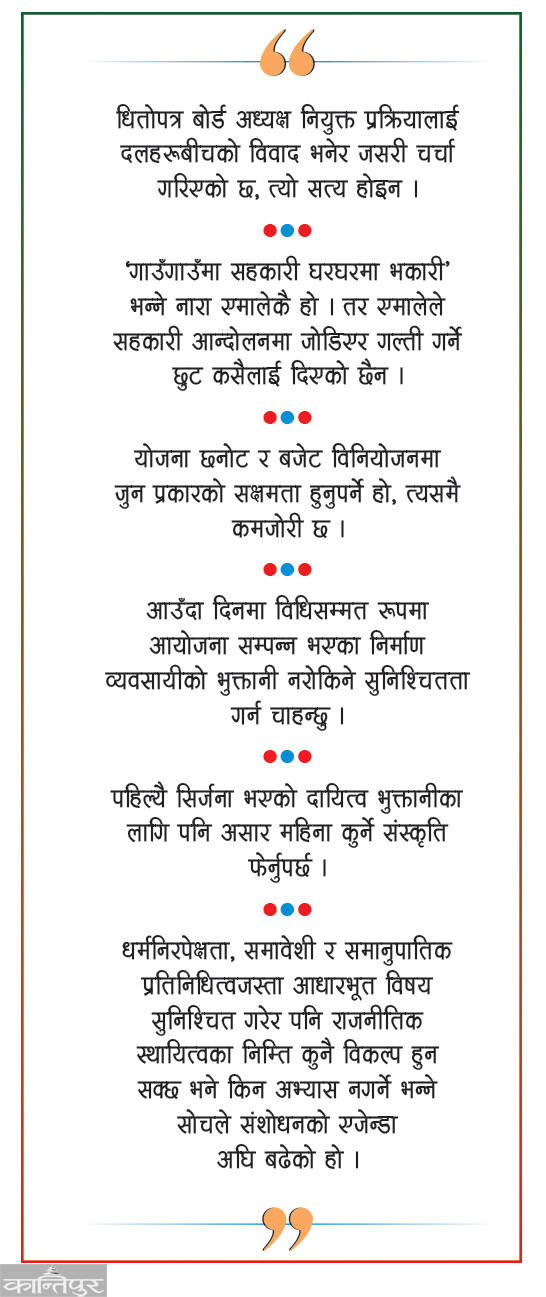
In general, communists are considered liberal and pujaists liberal towards the market economy. But a different scenario is seen in Nepal. In the last example too, when the finance minister is from the democratic party, the stock market goes down and when you become the communist and especially you, the finance minister, the market goes up. Why is this contradiction happening?
At this time, we have been saying that Nepal is adopting a mixed economy. Government (public) sector, private sector and cooperatives are the three dimensions of mixed economy. The private sector has a very large contribution. However, we believe that all three areas should be promoted together. From the point of view that we are communists, therefore we are hostile to the private sector, the economy cannot move forward. We want to develop all the three pillars of the economy in a balanced manner. We encourage the private sector to move forward especially in production and productivity enhancement, job creation, and investment expansion.
The government wants to move the stock market in a balanced and dignified manner, listen to the market's problems and solve them. Investors believe that this government will not make mistakes and will move forward with the right kind of policies, so it may have had a positive impact on the market. We have taken it as the citizens' trust towards the government. As more than 6.3 million people are directly connected with the stock market, the government is clear about the need for a balanced development of this sector.
We don't have an unbalanced practice, unbalanced analysis, unbalanced approach to the stock market. We believe that the stock market should be promoted in a mature manner. Our thinking and policy are like that. We want to say that investors' investment should not sink. We have found that investors are reassured because they want to facilitate policy. I have said that the capital market should be developed in a balanced manner. Its role is important for long-term capital and savings mobilization. I believe that this market, which has a large size of market capitalization and a large number of participants, should be promoted in an orderly, transparent and dignified manner.
What are the definite plans to promote the capital market in an orderly, transparent and dignified manner?
We do not view the stock market negatively. Some were also heard to analyze that the stock market is a gambling house. It gave a negative message. We have also seen the stock market as an important part of the economy. It should develop and expand with time. We want to make policy arrangements so that investors' investment does not sink.
The Nepal Securities Board, the regulatory body of the stock market, which is seen as a mirror of the economy, has been without a chairman for 6 months. Although the previous government started the process of appointing the president, the process had to be canceled due to a dispute between the power partner parties regarding the candidate. It is understood that one of the main reasons for the collapse of the previous alliance was the appointment of the board chairman. In this process, the new stock exchange license is added to the private sector investment. How do you go about this process?
The process of appointing the board chairman is discussed as a dispute between the parties, which is not true. Why the previous government did not or could not appoint a chairman, I could not say. It is wrong to say that any UML leader put pressure on the matter of the board chairman. The party that made Maoist chairman Pushpa Kamal Dahal the president, now that party is bargaining for the president of an ordinary organization? This is all just an attempt to exaggerate.
UML president KP Sharma Oli said that the person I told should be appointed as the chairman of the securities board, otherwise the alliance may be at the bottom, the outgoing finance minister Varshman Pun has said along with Kantipur. What's your reaction to this?
I didn't know what he said. If you say that, it is 100% untrue and baseless. That is frustration. This comment towards UML President and Prime Minister Oli is wrong, unfair and biased.
 Then tell me what is the opinion of this government about the chairman of the securities board and the new stock exchange?
Then tell me what is the opinion of this government about the chairman of the securities board and the new stock exchange?
The process of appointing the president started during the previous government and is pending in the honorable Supreme Court. We are aware that an institution like the Securities Board should not remain without leadership for long. We believe that the most qualified person should lead the securities board according to the prevailing law, and after the decision from the court, we proceed with the process according to the law.
Finance Minister Bishnu Paudel . Photos: Hemant Shrestha/Kantipur
We hire suitable people in a transparent manner. There have been various studies, researches on whether another stock exchange is needed or not. We study further. We proceed according to what suggestions come from it.
 The government-owned Nepal Stock Exchange was not allowed to undergo structural reforms while the new stock exchange process was underway. There is an allegation that the government tried to throw an ax in its own foot by tying the hands and feet of a well-performing public institution and started distributing licenses to the private sector.
The government-owned Nepal Stock Exchange was not allowed to undergo structural reforms while the new stock exchange process was underway. There is an allegation that the government tried to throw an ax in its own foot by tying the hands and feet of a well-performing public institution and started distributing licenses to the private sector.
I am also studying the licensing process of the new stock exchange, the related studies, the legal system, the restructuring of the Nepal Stock Exchange (NEPSE) etc. Then we do what needs to be done based on market needs and justifications. The subject of NEPSE restructuring came up last time when I was the finance minister. I also wanted to speed up the process. Being the finance minister for a short time at that time, the work could not be completed.
There are two arguments about the new exchange. There is an argument that when there is only one organization, it is a monopoly, it is better to create two and create competition. On the other hand, we want to move forward by making one strong. In the beginning, there were monopolies in telecommunications, banks, insurance and other sectors. It is also said that after the distribution of the new license, if there is a competitor, the consumer will get the direct benefit. We are hearing both arguments. We take appropriate decisions by careful study and analysis.
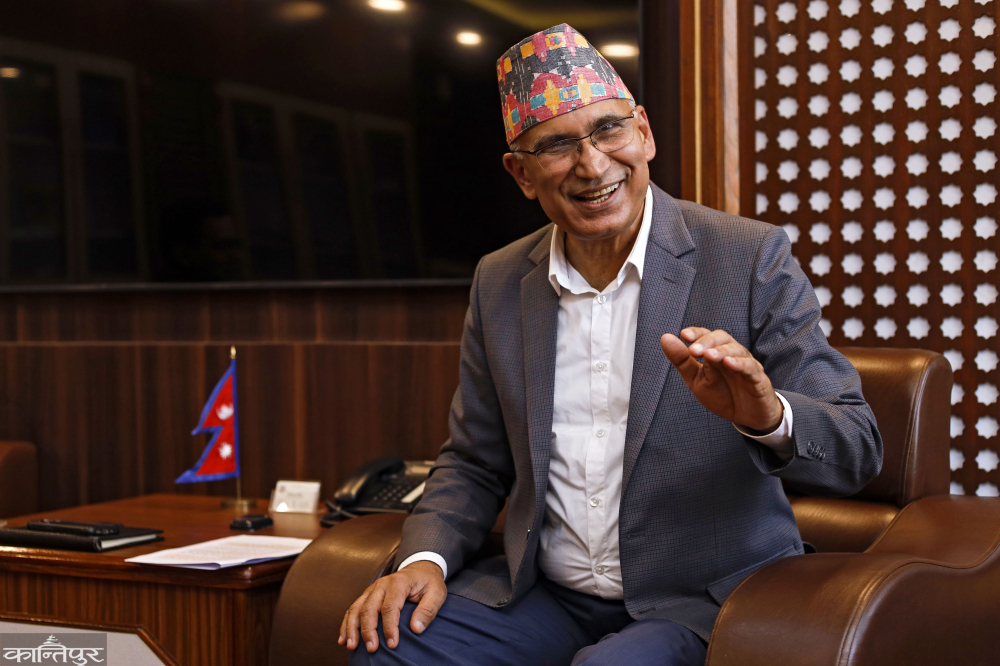 In a mixed economy, government, private sector and cooperatives are the main three pillars. At present, all the three pillars are badly shaken. The state of government finances is critical, the depressed morale of the private sector has not been strengthened. When they do not invest, 8 billion loanable amount is accumulated in the bank. Most of the cooperatives dealing with savings and loans are in a state of collapse. Since this is your fifth term as the finance minister, how do you plan to intervene in which areas to prevent the pillars of the economy from collapsing?
In a mixed economy, government, private sector and cooperatives are the main three pillars. At present, all the three pillars are badly shaken. The state of government finances is critical, the depressed morale of the private sector has not been strengthened. When they do not invest, 8 billion loanable amount is accumulated in the bank. Most of the cooperatives dealing with savings and loans are in a state of collapse. Since this is your fifth term as the finance minister, how do you plan to intervene in which areas to prevent the pillars of the economy from collapsing?
As the economy is not viable, investable funds are piling up in banks. Due to circumstances, industrialists have not been able to pay interest on old loans. They are in a situation of how to protect the business. They have not been able to borrow more. I am concerned about how they can be relieved now, what policies should be made to encourage production growth. Rastra Bank is bringing monetary policy in near future. The National Bank will also think about how to invest the money accumulated in the bank. The Ministry also works on how to create favorable conditions for investment. We work on what policy arrangements and facilitations will create an investment-friendly environment.
We must have the ability to move forward by solving the problems seen in the cooperative sector. Due to the lack of effective regulation, the lack of construction of necessary structures for regulation, and even leaving it free as self-regulation, problems have arisen in this sector. Now there is no option but to solve the distortions of this area and move on. First of all, regulation must be managed. Policy making has already started for that. We should proceed with a special plan to bring out the troubled cooperatives from that situation and to operate the rest on their own. We are determined that cooperatives should be made efficient, effective and well-governed.
Although the external indicators of the economy are strong, the situation of revenue, capital expenditure, foreign aid etc. is critical. Not only the private sector but also the trust of the common citizens towards the government is decreasing. What are your plans to keep the economy running in this situation?
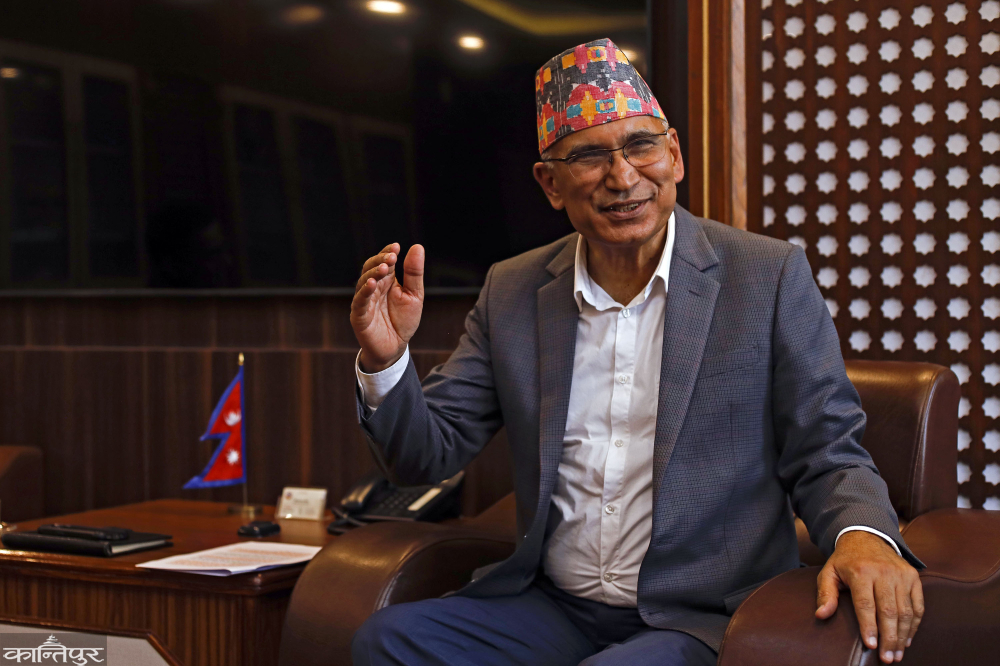 Capital spending power has declined. Increasing it is an important task of reforming government finances. Allocation skills should have been shown while making the budget, but it has not been shown. There is a weakness in the kind of ability that should be in plan selection and budget allocation.
Capital spending power has declined. Increasing it is an important task of reforming government finances. Allocation skills should have been shown while making the budget, but it has not been shown. There is a weakness in the kind of ability that should be in plan selection and budget allocation.
Increasing business confidence, increasing government expenditure, especially capital expenditure, areas of comparative advantage to increase demand, especially the Ministry of Tourism, Energy, Agriculture and Livestock Development, encouraging the promotion of information technology, removing supply barriers, providing policy stability, making cooperation with the private sector credible , my efforts will be to make necessary arrangements through fiscal and monetary policy to address external causes and challenges. There is despair in the economy everywhere. Market demand has decreased. Production has decreased. Some industries have closed down, many industries are running at low capacity.
Government revenue, consumption, imports, exports, employment have all decreased. Industrialists took loans on the assumption that business would expand. Due to circumstances, the business did not go according to their plan. Now they are unable to pay the bank installments. The number of blacklists has increased. Now their concern is how to stay in business, how to avoid being blacklisted. This problem has caused psychological pressure. They must be brought out of despair. How can we solve their problems?
Till the last day of the last financial year, the expenditure is 3.5 trillion rupees more than the income of the government. This year also there are no signs of significant increase in revenue collection. There is a situation where the revenue can barely cover current expenses. Vidyadhar Mallick's report on tax reform also revealed that there are many leakages in tax administration. What are your plans for tax administration reform?
I work primarily on how to make tax administration disciplined, accountable and competent. I make a special action plan (action plan) with individual responsibilities and implement it effectively. I develop an environment where good behavior is rewarded and bad behavior is punished.
There is a need for a major change in our tax structure, to maintain a tax-friendly professional and technology-based tax administration, to increase tax participation by expanding the scope of taxes, to maintain tax rates only on an objective basis, to increase market monitoring, to prevent leakages, not to give unnecessary hassle to taxpayers, spontaneous The government is committed to developing a tax-paying culture.
Before coming to the government, the current year's budget could not speed up the sluggish economy, the current Prime Minister Oli, you and the ruling party and opposition MPs of the previous coalition held the view. Some MPs even tore up the budget on the rostrum. At this time, the government has two ways open to implement this budget or bring a supplement. Which way do you choose? I don't want to make too many negative comments about the
budget. Regardless of the situation, we also voted and passed the budget. This year's budget making process is interesting. One finance minister presented the principles and priorities of budgeting, another finance minister presented the budget and another finance minister came to implement it. The parties of those ministers are also different. Now I am not thinking about the supplementary budget. We will proceed to the implementation of the budget. Based on the experience gained during the implementation of the budget, it can be reviewed if necessary.
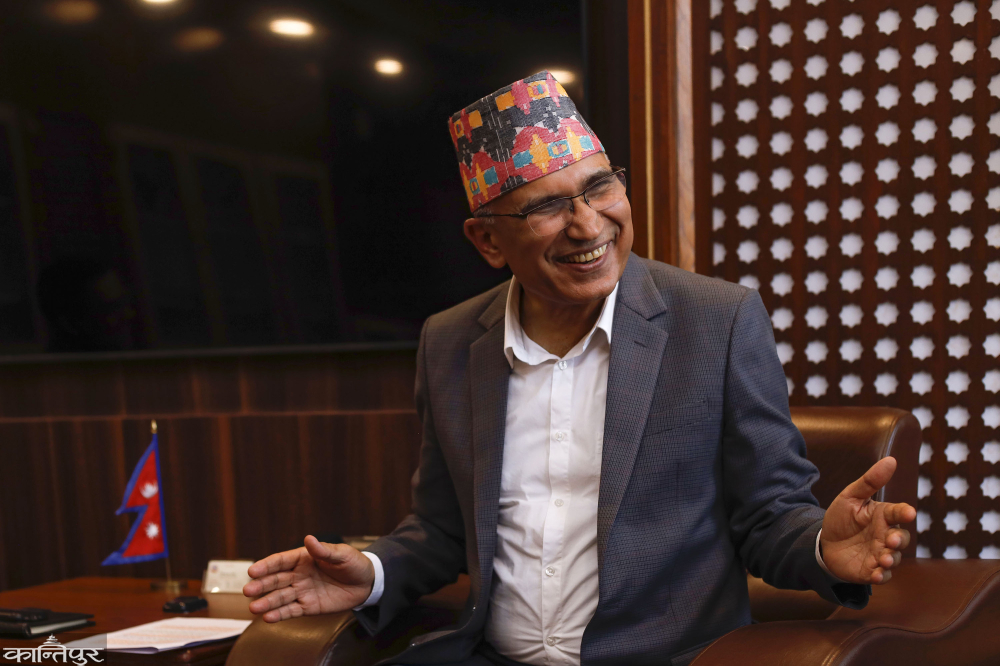 Even though the parliamentarians hold discussions and dozens of amendments every day, the provision of the allocation and its dependent bill (budget) submitted by Sarka to the parliament is passed without any change. How will the general public understand the situation of having to revise the budget brought by the government involved?
Even though the parliamentarians hold discussions and dozens of amendments every day, the provision of the allocation and its dependent bill (budget) submitted by Sarka to the parliament is passed without any change. How will the general public understand the situation of having to revise the budget brought by the government involved?
In relation to Section 57 of the Income Tax Act, there was a proposal to amend the Economic Act. In this regard, after the amendment proposal was presented in the House of Representatives, it was also discussed. However, the House of Representatives passed it without amendment. Some MPs proposed amendments in the National Assembly. The National Assembly showed interest in it and decided to send it to the House of Representatives with suggestions. It was accepted by the House of Representatives. Regarding the amendment of Section 57 of the Income Tax Act, some experts also expressed their opinion.
The section has been amended with the good intention that it should primarily be revenue protection. The aim is to find loopholes in the law so that no one gets an opportunity to do revenue planning. It is our desire that the state should not lose the revenue it should get according to the law. I am not saying that the budget should always be amended in this way, but sometimes when this type of problem arises, it should be amended. Now, when the budget is passed, the state faces the risk of losing a large amount of revenue. Therefore, the suggestion given by the National Assembly had to be accepted. What has been practiced is not in conflict with our laws and policies.
He said that if the budget is not revised, the state is at risk of losing huge revenue. Is there really a problem behind the removal of the system or is it just a political trick?
I don't want to go into the matter of what was the intention of the previous government to amend that section. Various opinions are coming from experts and stakeholders about this section. But it has been done so that the facility is not misused, revenue leakage is not done, and the tax system is not distorted. I have found that everyone has taken this as a positive step.
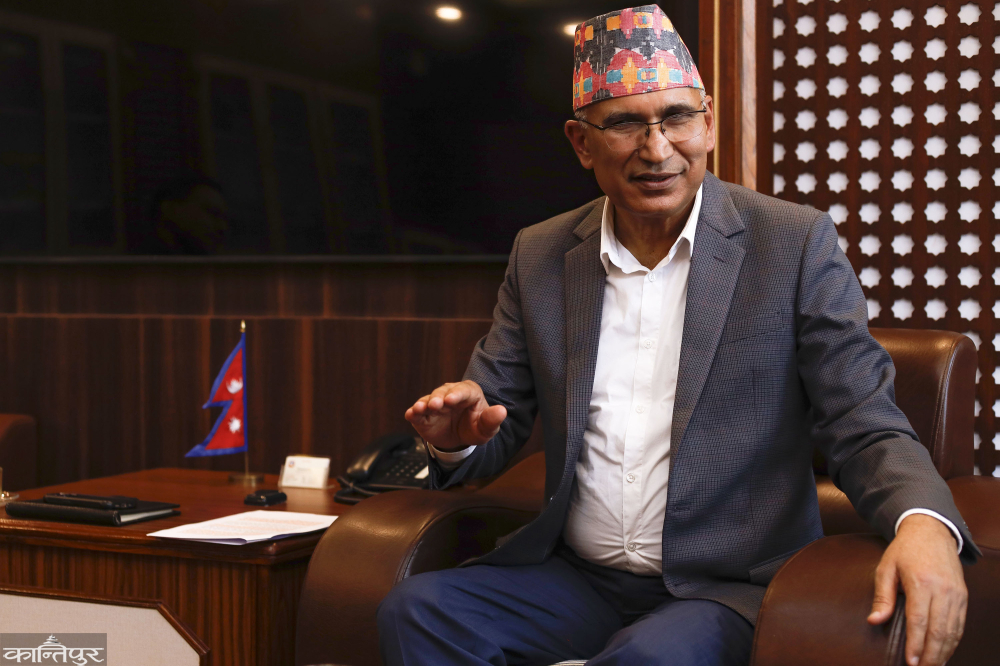 For the last two years, the government has had to allocate more budget for financial management than capital expenditure. Even the government loans could not be mobilized in the productive sector. There is also a situation where you have to take a loan to pay the interest on the loan. How is the government reducing this risk?
For the last two years, the government has had to allocate more budget for financial management than capital expenditure. Even the government loans could not be mobilized in the productive sector. There is also a situation where you have to take a loan to pay the interest on the loan. How is the government reducing this risk?
The government should take a balanced view on public debt. Meanwhile, the country went through a special situation. We also had to face calamities like earthquake and covid infection. This is the reason why public debt has increased in recent years. However, the current debt is beyond our control, not unmanageable. Most external loans are at subsidized interest rates.
It is not bad to invest in projects that give good returns by taking concessional loans. But while taking a loan, one must be aware of the interest rate and where to invest. There is no need for us to fall into the trap of debt. However, while taking loans in the future, we will take them with the assurance that production and productivity will increase, investments will be made in projects of national interest and priority.
Now, radical reform in government finance is not possible without increasing the size of the economy and revenue mobilization, without bringing effectiveness in budget implementation. The amount of financial arrangement will also be spent mostly on capital. Efficiency should be brought in the utilization of public debt. As soon as I assumed office, I approved a roadmap for using innovative tools of development finance. This opens the way to reduce debt burden and mobilize private capital. The past practices will have to be changed. I insist on that.
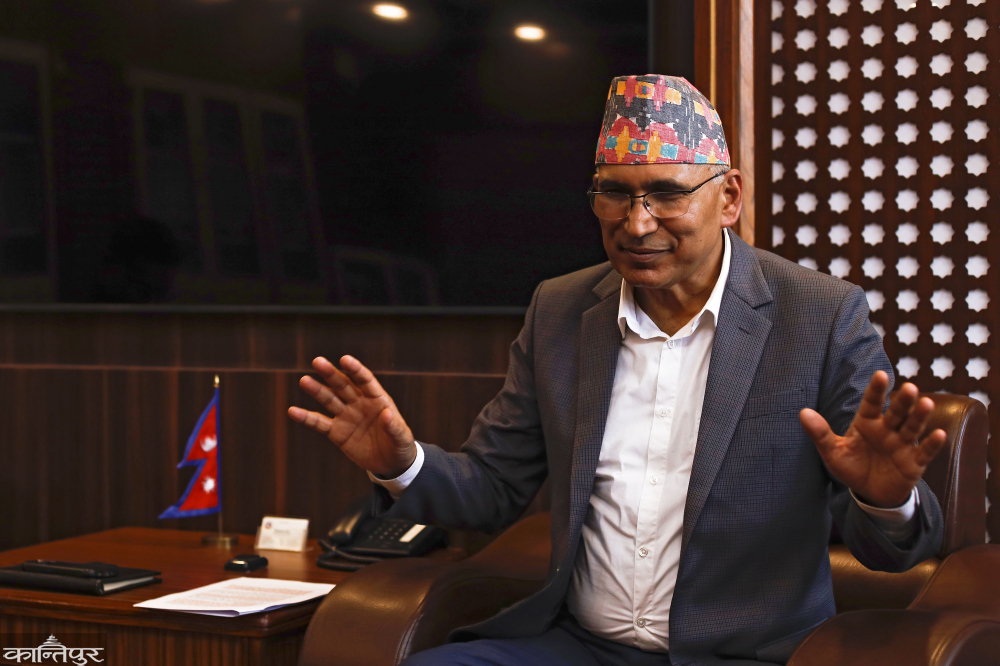 Many stakeholders including the private sector have been hoping that a loose monetary policy will come and the economy will become viable, saying that the budget could not address the problems of the current economy. In such a situation, how is the Ministry of Finance coordinating with the National Bank, so that the expectations of stakeholders are met and the Ministry of Finance does not appear to be interfering?
Many stakeholders including the private sector have been hoping that a loose monetary policy will come and the economy will become viable, saying that the budget could not address the problems of the current economy. In such a situation, how is the Ministry of Finance coordinating with the National Bank, so that the expectations of stakeholders are met and the Ministry of Finance does not appear to be interfering?
The formulation of monetary policy is basically related to the autonomy of the National Bank, but as the policy has an impact on the overall economy, it is not a matter of formulation in isolation. We have debated and discussed solutions to the problems of the economy. I have received information that the National Bank is making final preparations to introduce a monetary policy as per the needs of the situation.
As the National Bank is an autonomous institution, I am firm that the Ministry of Finance should not interfere unnecessarily. Although deposits are increasing but there is no demand for loans, billions of investable funds have accumulated in the financial system, borrowers have to close their businesses due to non-payment of interest and are blacklisted. As the National Bank is looking at all these problems in a subtle way, I am confident that a new monetary policy will come within its limits and scope.
Many builders have been blacklisted this year due to non-payment of money by the government. The government has not been able to pay interest subsidies, agricultural insurance, export subsidies, corona insurance etc. When will you pay that amount?
The payment of the builders who have completed the work and completed the process according to the law is not stopped. I would like to ensure that in the coming days, the payment of the builders who have completed the project legally will not be stopped. Payment of subsidized interest loans, agricultural insurance, export subsidy, etc. is also not stopped. We pay in stages depending on the situation.
Every government makes a policy saying that they will maintain good governance through money transfers, year-end expenses, and the expenses of the last week of June to stop the irregularity of government spending. But the trend of spending a large amount of money in the month of June is continuing. Why is the government unable to improve the state of government finances?
When preparing a budget, there is a situation where you have to transfer money if you cannot make realistic estimates. The constitution and the economic procedure law also provide for the transfer of funds when necessary. The tendency to transfer money to regular schemes and programs should be discouraged except in case of immediate, calamity or similar emergencies. Project management should work according to the annual calendar regarding the tendency to spend large sums of money in June. The culture of waiting six months for the payment of already created obligations should be changed.
The main problem of the current economy is lack of demand. Investment, production, import, employment have all decreased due to the decrease in market demand. About 80 percent of the total investment in the economy is in the private sector. Therefore, unless the private sector is encouraged to invest more, there is little chance of credit expansion. Does the government have any such discount and subsidy schemes, which will encourage the private sector to invest more?
We have been conducting various programs to encourage private investment. Like – export incentives, production based subsidies, concessional loans etc. Now all of them have to be reviewed and updated. I will give priority to the areas of comparative advantage in the fields of tourism, energy, agriculture and information technology to create an investment-friendly environment and to establish Nepal as an attractive destination for foreign investment.
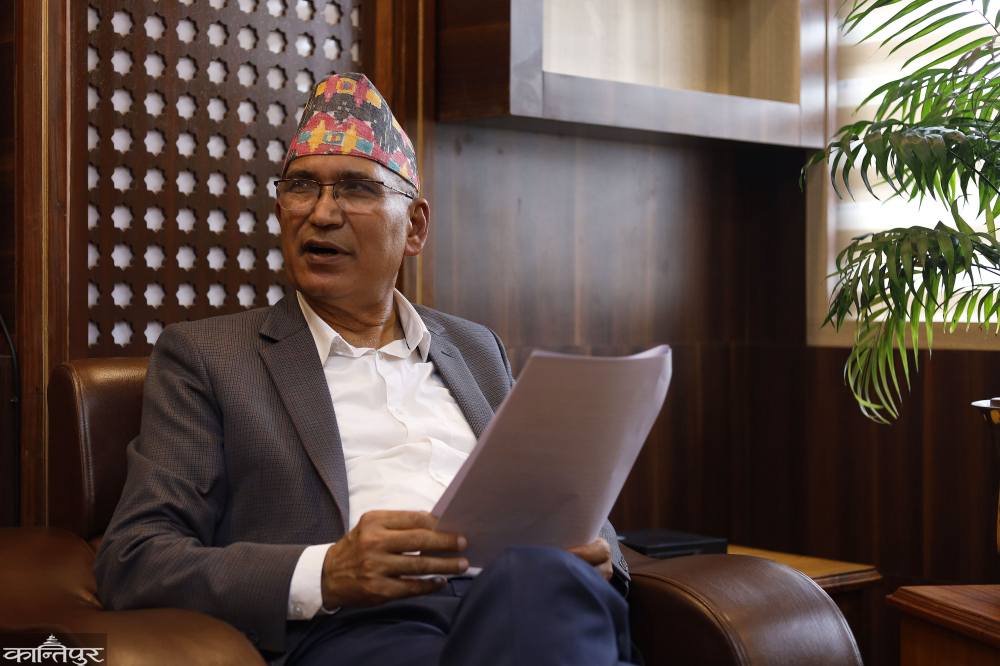 UML president Oli is now the prime minister. More than 90 percent of cooperatives are run by people. Their organization is in a lot of trouble. There is also an allegation that UML does not have that power because it has to be ruthless towards its own workers if it is to solve the problems in this area. It is not to be hidden that UML has a great role in making the
UML president Oli is now the prime minister. More than 90 percent of cooperatives are run by people. Their organization is in a lot of trouble. There is also an allegation that UML does not have that power because it has to be ruthless towards its own workers if it is to solve the problems in this area. It is not to be hidden that UML has a great role in making the
cooperative campaign strong and effective. UML's slogan of making the cooperative movement powerful is 'Gaungaon ma sahakari ghar ghar ma bhakari'.
However, UML has not given anyone an excuse to make mistakes by joining the cooperative movement. We have recommended legal action against the wrongdoers but we are not going to protect them. We work to correct the mistakes, punish them and solve the problems by creating an environment that allows the cooperative to move forward in a normal state.
The report submitted to the government by the committee formed to study and investigate the issue of Ncell share purchase and sale under the coordination of Tankamani Sharma has not been implemented. The report suggested that Ncell's share buying and selling business cannot be accepted in the current situation. What is the government's opinion in this regard?
I have not been able to see that report. After looking at the report, we make a decision that is in the interest of the nation and the citizens within the legal framework. What is our legal arrangement, which organization has done what kind of work based on which law. Let's proceed after studying all those subjects.
In order to advance China's ambitious project Belt and Road Initiative (BRI), a dispute arose between the partner parties in the previous government regarding the signing of the 'BRI Implementation Plan' document. Congress has clearly said that they can take grants from BRI, but not loans. Earlier, BRI was started on the initiative of the current Prime Minister Oli. Is the government in a situation where we only take grants from BRI, not loans, or will it be reconsidered?
In relation to taking loans from international development partners and neighboring countries, we should pay attention to what and how much interest rate we take. It does not mean that we take it from one country or entity or we don't take it from another. Borrowing is based on needs and preferences. Even now we can take loans on the same basis. Therefore, we are not in a dilemma as to which agency to borrow from and which one not to.
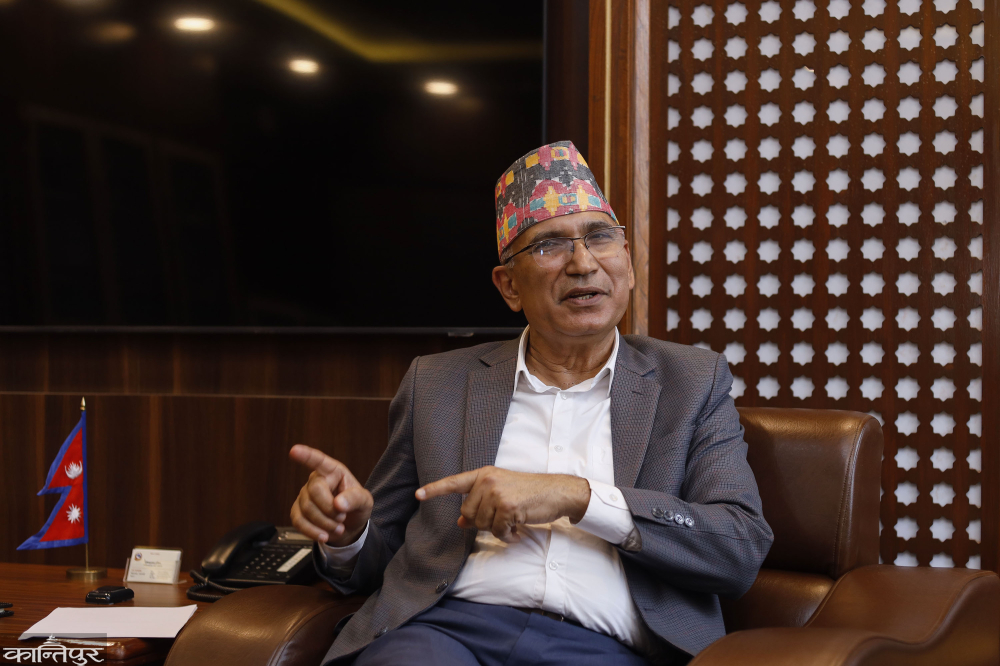 The main reason for the collapse of the old alliance and the formation of a new one was the agenda of constitutional amendment and political stability. However, the seven-point agreement between Congress and UML has not been made public yet. Especially regarding the amendment of the constitution, homework does not seem to have been done. Was it said that the amendment of the constitution was only for the formation of the government, or is it really to start the work?
The main reason for the collapse of the old alliance and the formation of a new one was the agenda of constitutional amendment and political stability. However, the seven-point agreement between Congress and UML has not been made public yet. Especially regarding the amendment of the constitution, homework does not seem to have been done. Was it said that the amendment of the constitution was only for the formation of the government, or is it really to start the work?
Constitution amendment is said to be done for real. Amendment of the constitution is not something that can be done tomorrow. It is said to amend the federal democratic republican constitution with the aim of making it more efficient and effective. Some have commented that the amendment to the Constitution is too light and superficially retrogressive. I have nothing to say about those comments. Events in the coming days will answer them. We want to amend the constitution to be suitable for effective implementation.
 प्रकाशित : श्रावण ६, २०८१ ०८:५५
प्रकाशित : श्रावण ६, २०८१ ०८:५५

 २२.१२°C काठमाडौं
२२.१२°C काठमाडौं











